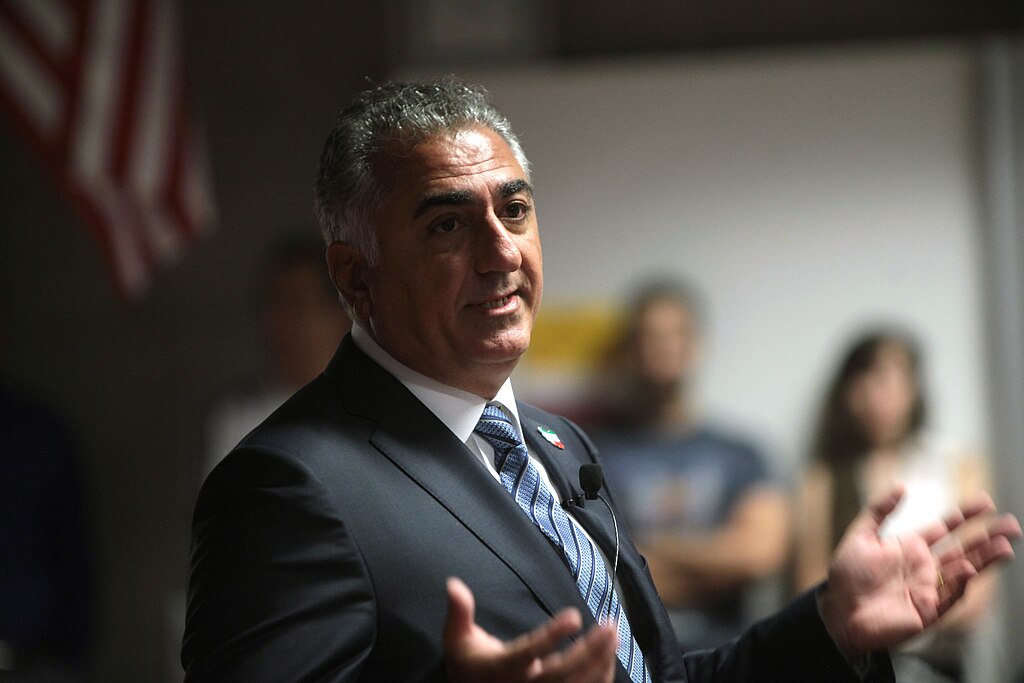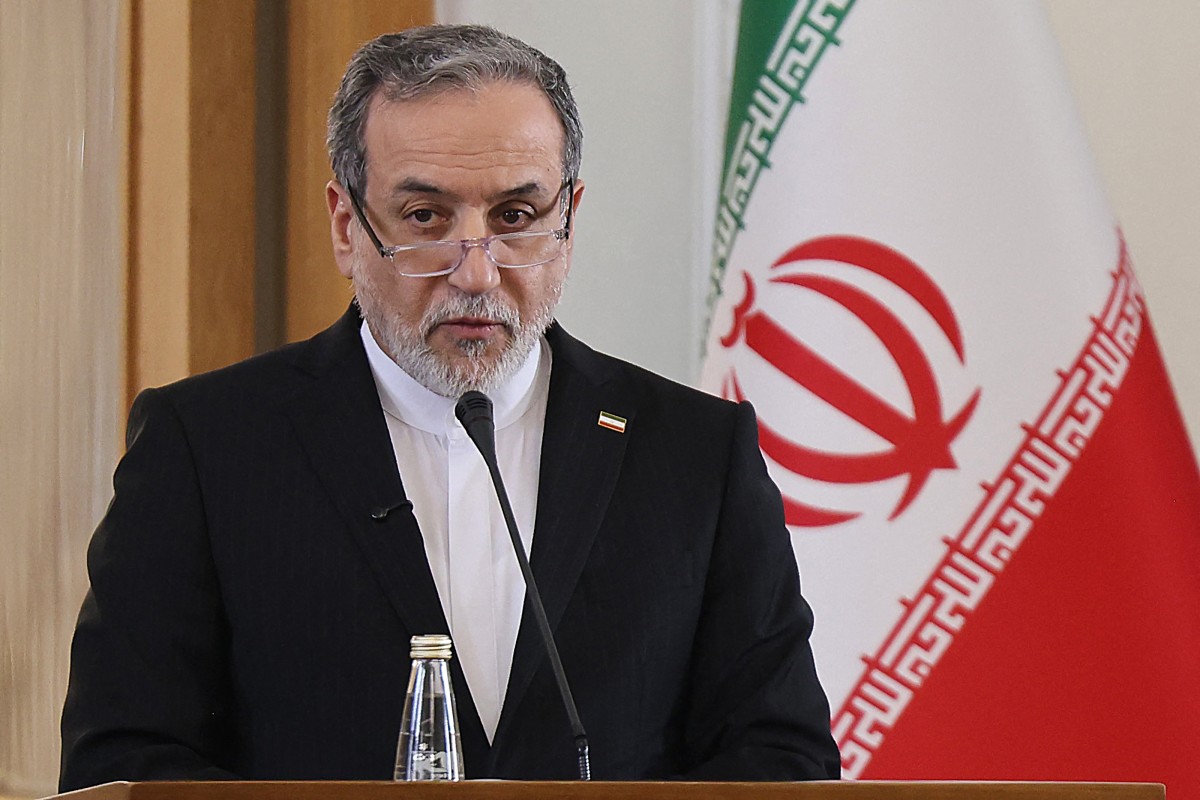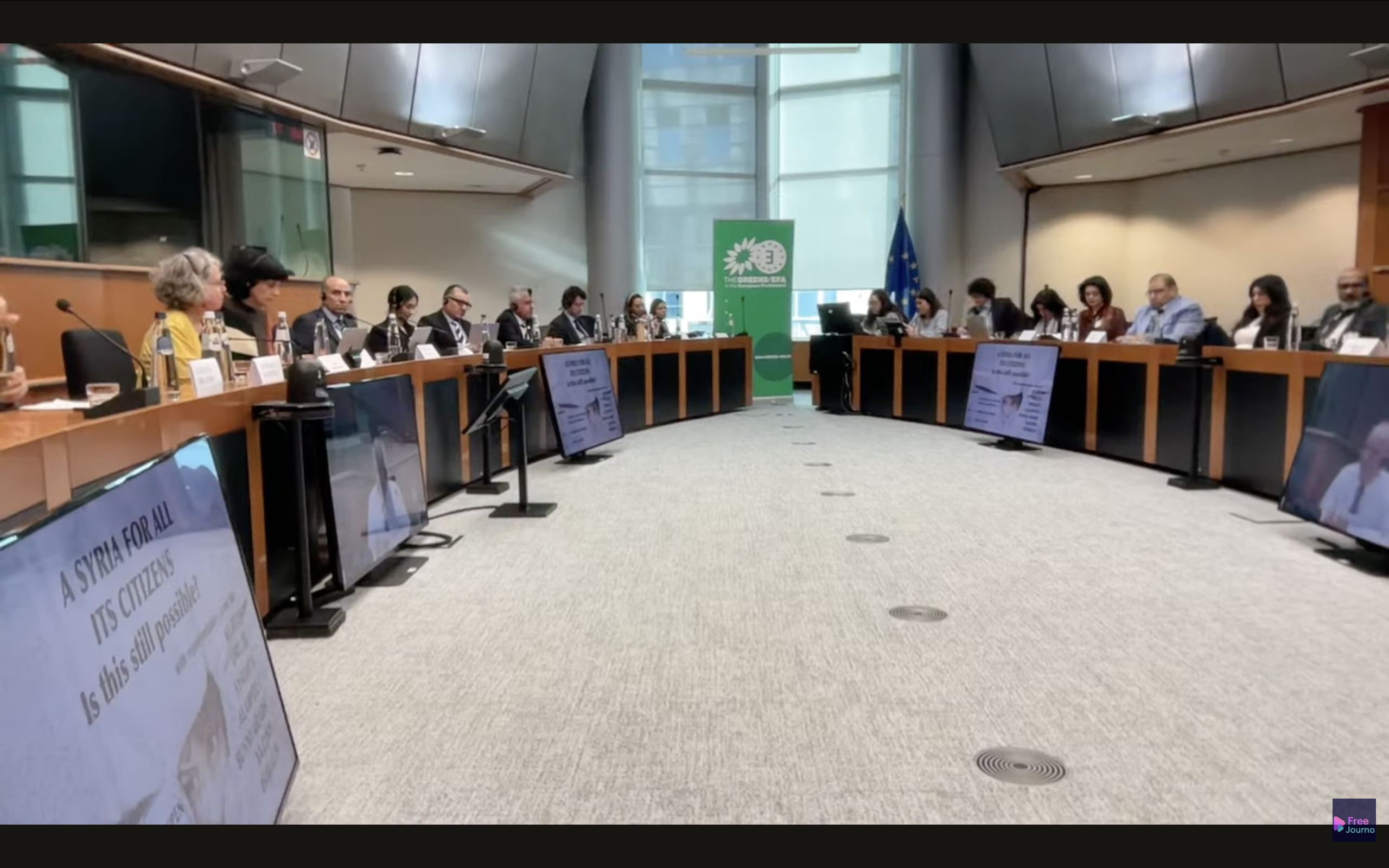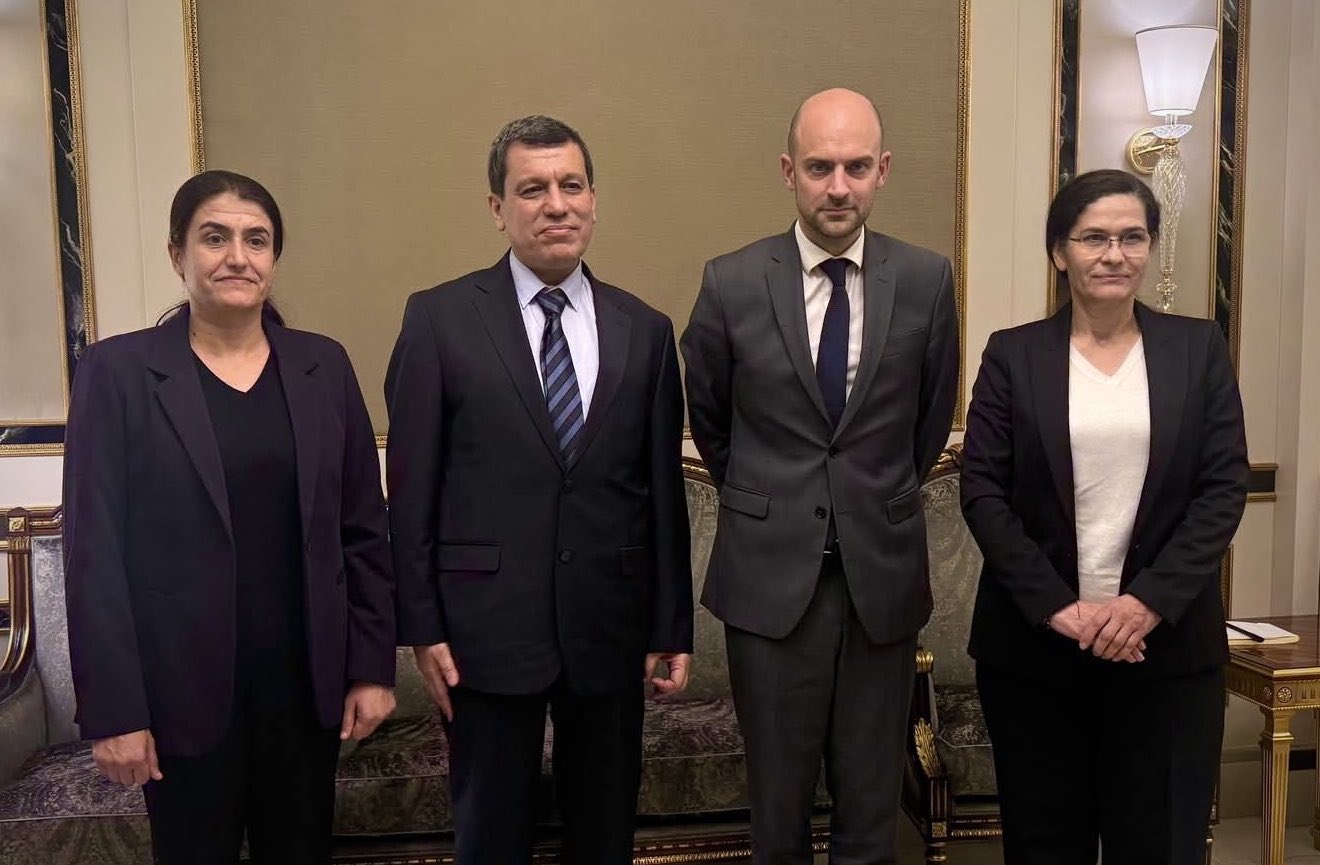Israel’s Online Campaign to Amplify Reza Pahlavi
Since the last uprising attempt in Iran in 2022, Reza Pahlavi, the self-proclaimed prince and son of the last Shah of Iran, has grown increasingly eager to brand himself as the only alternative for Iran post-Islamic Republic.
He claims to be the “only one” who can restore “past glory, democracy, and prosperity” to his homeland. Yet, how he perceives himself and how the Iranian peoples and political spectrums across the country perceive him are two contradicting stories.
In the early hours of 13 June, 2025, Israeli jets and drones struck over a dozen locations across Iran. A surprise assault that shocked both the authorities in Tehran and Pahlavi in his base in the United States.
As Israel and Iran were busy exchanging fire, Pahlavi seized the opportunity and began his tour of the U.S. and Europe, giving interviews in support of Israel’s actions.
In a BBC interview, he stood firmly behind Israel, echoing Israeli officials’ calls for Iranians to flood the streets amid the bombardment of Tehran, though not a single protest followed his call. The people of Tehran and elsewhere in the country refused to protest, deciding instead to stay home or flee the capital.
Israel Scratches Pahlavi’s Back
An investigation by Haaretz and TheMarker, in collaboration with Citizen Lab at the University of Toronto, exposed a sophisticated online campaign to promote Reza Pahlavi as the figurehead for regime change in Iran.
Months after the 12-day war, an Israeli media outlet revealed a clandestine operation backed by the Israeli establishment, funded by Benjamin Netanyahu’s government.
An investigation by Haaretz and TheMarker, in collaboration with Citizen Lab at the University of Toronto, exposed a sophisticated online campaign to promote Reza Pahlavi as the figurehead for regime change in Iran. Launched around Pahlavi’s 2023 visit to Israel, it employed fake social media profiles posing as Iranian citizens, AI-generated content, and deepfake videos to bolster his image and advocate for monarchy restoration.
The Haaretz investigation revealed that this effort was partially funded by Israeli public resources, aligning with Israel’s geopolitical aims during the 12-day war. The operation involved Farsi-speaking operatives crafting content to appear as originating from Iranian citizens inside Iran, using X and Instagram to spread pro-Pahlavi messages.
On the other hand, Citizen Lab researchers identified a network of over 50 inauthentic accounts sharing AI-generated videos and false narratives to destabilize Iran’s regime by encouraging protests, capitalizing on real issues like Iran’s water crisis, poverty, corruption, and mandatory hijab laws.
The Haaretz investigation revealed that Tel Aviv’s campaign also promoted hashtags like #KingRezaPahlavi and disseminated fabricated content supporting the return of the monarchy.
In this environment, Pahlavi, exiled since 1979, talked about nonviolent resistance, ballot-box democracy, and lofty ideals, especially in his interviews with the Western media.
However, experts like Kamran Matin, Senior Lecturer in International Relations at the University of Sussex, argue that Pahlavi’s alignment with Israel during the 12-day war “ended his already non-existent political career and the prospect of restoring the monarchy in Iran.”
So far, Israeli officials chose not to comment on the Haaretz and Citizen Lab investigation outcomes. What remains unclear is why Israel decided to bet on him.
Exiled Iranian journalist Kambiz Ghafouri believes that Israel’s support for Pahlavi is not about democracy or solidarity with Iranians, but rather “simply about keeping Iran weak and divided.”
Exiled Iranian journalist Kambiz Ghafouri believes that Israel’s support for Pahlavi is not about democracy or solidarity with Iranians, but rather “simply about keeping Iran weak and divided.” In other words, Israel is not helping Iranian opposition circles to unite against the government of the Islamic Republic.Its approach, in fact, weakens the ranks of the opposition, which only benefits the state itself.
The campaign’s tactics, according to Citizen Lab and Haaretz, mirror those used in pro-Iranian disinformation efforts against dissidents, promoting the return of Pahlavi and the monarchy. Thus, an overlap emerges between Iran and Israel; both sides of the conflict appear to have invested in the same figure.
“Interestingly, the [Iranian] regime has significant influence within Reza Pahlavi’s camp. They’ve placed their own people around him,” Ghafouri adds. In October 2023, Mike Pompeo, former secretary of state, stated that “the Shah’s supporters were exposed when they heavily relied on collaboration with the IRGC [Islamic Revolutionary Guard Corps].”
Ghafouri points out that although the Islamic Republic clearly does not want a united opposition, it is surprising that Israel, as the enemy of Iran, also wants “a controlled figurehead.”
Reza Pahlavi, 65, is the exiled son of Iran’s last monarch, Mohammad Reza Shah Pahlavi, who ruled Iran with an iron fist from the 1950s until he was overthrown during the 1979 Islamic Revolution. Living primarily in the United States since his teenage years, the self-proclaimed crown prince has long positioned himself as a leading figure of the Iranian opposition. While he advocates for a secular and democratic Iran, his royal lineage and Western alliances have limited his appeal among Iranians inside the country, where memories of the Shah’s authoritarian rule prevail. On the other hand, although Iranian communities want change, most are cautious about international intervention, remembering the deeply traumatic 1952 American-British sponsored coup.
Ultimately, Israel’s bet on Reza Pahlavi reflects a broader misreading of Iran’s political reality. While Tel Aviv may hope that amplifying an exiled monarch can weaken Tehran from a distance, the strategy is backfiring. By gambling on a figure with little credibility inside Iran, Israel is echoing the Islamic Republic’s own playbook of illusion, division, and control. In trying to unseat its rival, Israel may be beating a dead horse by investing in a virtual leader whose throne exists only online.
Despite some nostalgia for the monarchy among ethnic Persians, Reza Pahlavi has failed to rally the masses around his monarchical political vision.
A Virtual Throne Amid Real Skepticism
Despite some nostalgia for the monarchy among ethnic Persians, Reza Pahlavi has failed to rally the masses around his monarchical political vision. His calls for action met with a weak response, even in the West. Undeterred, he shifted to a strategy of “change from above.”
Here, his fake social media support proves useful, allowing him to brag to Western leaders about his supposed popularity. Pahlavi recently claimed over 4 million views for his online campaign.
Just four days after the ceasefire with Israel, while Iranians were waking up from the war’s shock, he launched the so-called National Cooperation platform, an online portal for military and security defectors to register via QR code, without security or vetting measures.
A week later, he proudly posted on X: “The National Cooperation platform, a secure channel for military, security, law enforcement, and government forces, has attracted nearly 20,000 registrants.”

Ever since the QR code appeared on Iran International, an anti-Iranian government broadcaster allegedly funded by Saudi Arabia, which leaned toward Israel’s narrative during the 12-day war.
Pahlavi’s latest venture, the Rise Iran! or IranoPasMigirim (“We Will Take Back Iran”) campaign, encourages sign-ups on a designated website, which he claims surpassed 4 million views within weeks.
At the Munich Convention of National Cooperation to Save Iran, Pahlavi attempted to rally his followers around the preservation of Iran’s territorial integrity, individual freedoms, the separation of religion and state, and the future democratic principles of the government structure.
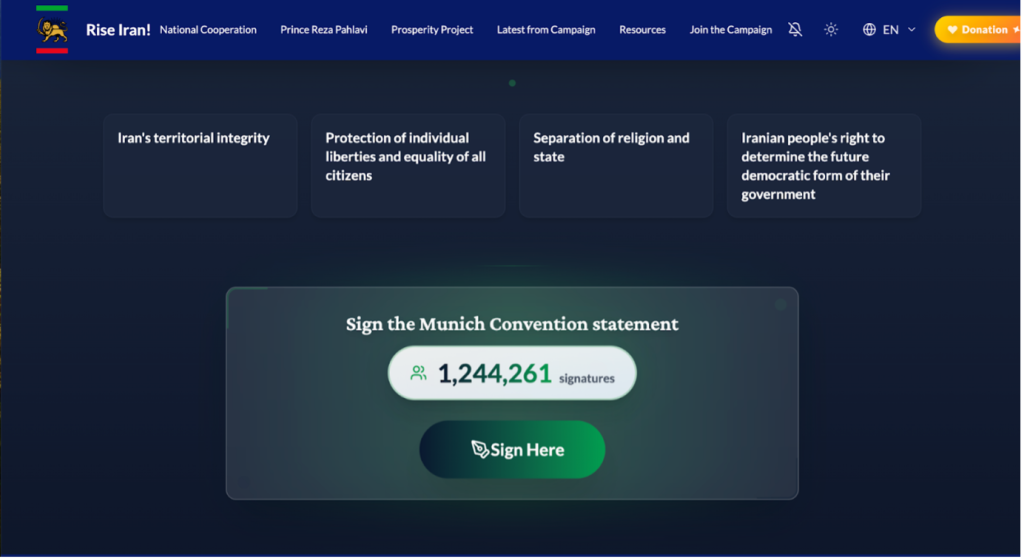
However, independent observers monitoring the site detected a suspicious pattern: signatures followed a fixed formula, generating random numbers in five daily timeslots over four days, from 9 PM on 9 October to 9 PM on 13 October, 2025, Toronto time. A cross-examination by The Amargi confirmed these signatures were likely generated by bots or AI tools.
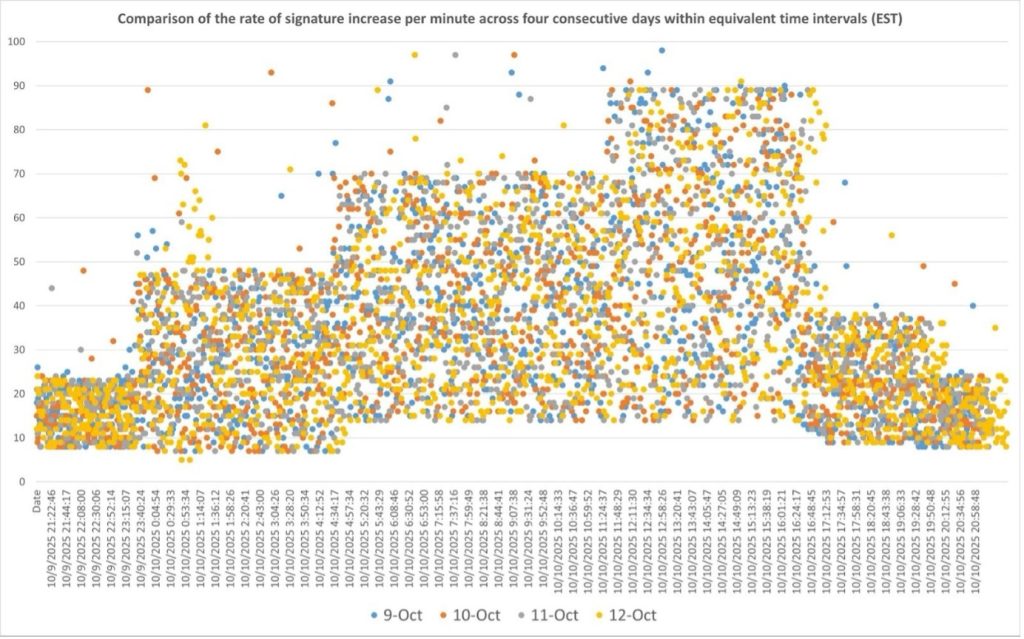
Pahlavi is not the first to use “fake followers” to inflate a campaign, but he faces a regime with a far more formidable “cyber army.”
Some reports suggest that as of early 2025, approximately 73.2 million people in Iran had internet access, representing 79.6% of the total population. In addition to this, according to a report from Iran’s Ministry of Foreign Affairs in 2021, there are over 4 million Iranians living abroad.
Without mobilizing Iranians inside the country, his time in Iran’s political arena may be fading away.
As Ghafouri observes, many supporters are now puzzled by the “empty noise” surrounding Pahlavi: “They expect real action, not endless social media theatrics.”
For now, Pahlavi and his advisors celebrate themselves in the “virtual” support of Iranians and the tangible backing of elements within Israel’s government.
The Amargi has contacted Reza Pahlavi’s office for comment, but has received no reply.
Soran Ibrahim
Soran Ibrahim is a Kurdish journalist and documentary filmmaker exploring the human cost of conflict in the Middle East and Ukraine.

